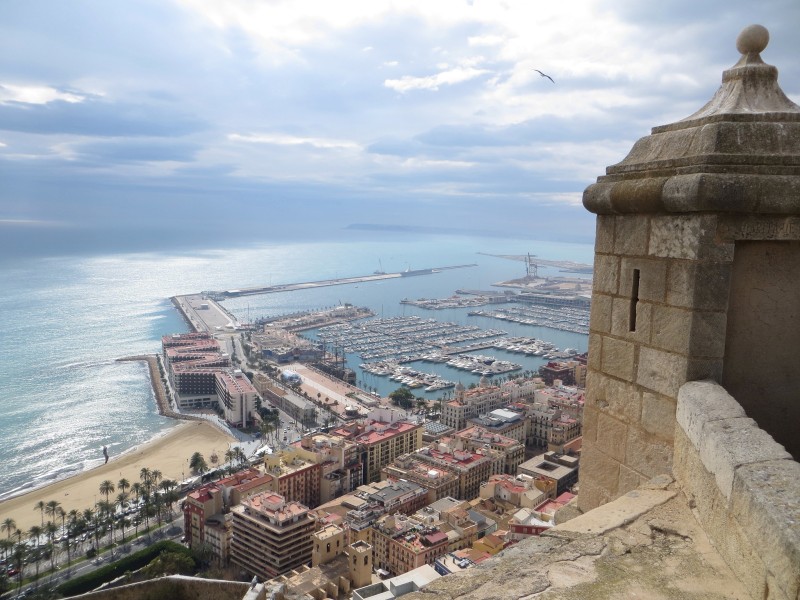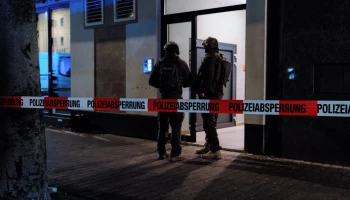Reported by
The director of a Russian cultural center in Spain has been quietly working to push Moscow’s narrative on European soil, according to leaked documents reviewed by OCCRP and El Periódico.
Aleksandr Chepurnoy, head of Casa de Rusia in Alicante, portrayed himself in private communications as a key Kremlin proxy operating under the umbrella of Pravfond — a Russian state-linked foundation sanctioned by the EU in 2023 for its role in propaganda and influence operations abroad.
In dozens of internal messages sent to Moscow, Chepurnoy outlined how he used Russian state funds to organize public actions in Spain that aligned with Kremlin interests. These included anti-NATO campaigns, protests against the imprisonment of alleged Russian spy Pablo González, and an effort to block a photo exhibit on Russian war crimes in Ukraine.
Chepurnoy, whose organization claims to promote “peace between nations,” reported to Pravfond’s leadership — including its sanctioned president Aleksandr Udaltsov — on what he described as “tactical and strategic” activities carried out by his Spanish branch in 2023 and 2024. Among them: cultivating “a pool of Spanish lawyers and journalists loyal to the Russian Federation.”
According to the leaked reports, Chepurnoy also took credit for a low-profile protest campaign in El Campello, near Alicante, aimed at NATO, and another demanding the release of González, a dual national arrested in Poland on espionage charges in early 2022 and later exchanged in a Russian spy swap in 2024.
But one of the operations he most proudly recounted to Moscow involved halting a 2023 photography exhibition at the University of Alicante. The show, “86 Days Under Siege,” featured harrowing images from Mariupol, Ukraine, taken by Azov Regiment photographer Dmytro Kozatskyi — recently freed from Russian captivity.
Chepurnoy described mobilizing Russian residents in Spain, “antifascist” groups, and online influencers — including pro-Kremlin blogger Liu Sivaya — to pressure the university into canceling the event. “The coordination of these forces directly by the leadership of the center achieved results,” he wrote.
OCCRP and El Periódico obtained the materials as part of a larger investigation into Pravfond’s activities across Europe. More than 50,000 internal documents reveal that the foundation has continued to fund influence operations in EU territory, despite sanctions. Chepurnoy’s signature appears on financial documents and reports dated well after the 2023 ban.
Chepurnoy did not respond to requests for comment.
Under the banner of legal aid for fellow Russians in trouble abroad, a state-backed foundation in the center of Moscow has for years advanced the Kremlin’s agenda across the world.
Pravfond has funded the legal defense of alleged spies and criminals, backed propaganda outlets, and worked hand-in-glove with intelligence operatives. Despite being sanctioned by the European Union in 2023, Pravfond has continued to issue grants and operate in multiple countries with little disruption.
A broader investigation by OCCRP — Dear Compatriots — based on tens of thousands of internal emails and documents, reveals the inner workings of this influence machine, which seeks to turn every Russian abroad into a potential agent of the Kremlin.
In a related case published on Wednesday, OCCRP partner iFact reported that Russian human rights lawyer Maria Arkhipova provided reports from Georgia to Pravfond, including the names of anti-Kremlin activists and details on local protests. Despite her public image as a dissident, Arkhipova maintained ties to the Russian state foundation for years.
Earlier this year, OCCRP also reported that Australia sanctioned Pravfond for funding pro-Kremlin propaganda and legal aid to allies such as Simeon Boikov, the Sydney-based activist known as the “Aussie Cossack.” Internal records showed Pravfond covered tens of thousands of dollars in legal fees for Boikov, who gained notoriety for spreading disinformation and avoiding arrest by hiding in the Russian consulate. Australian authorities warned that Pravfond’s activities were of "strategic significance to Russia" and posed a threat to public opinion abroad.
Pravfond, officially known as the Foundation for the Support and Protection of the Rights of Compatriots Living Abroad, was established in 2012 under then-president Dmitry Medvedev. While it purports to provide legal aid and defend human rights, European and Australian officials have identified it as a covert tool for Kremlin soft power and foreign intelligence networks.
OCCRP reached out to Pravfond for comment prior to publication, but received no response.






